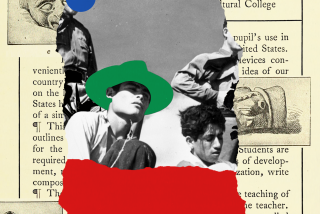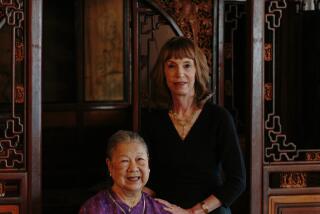See on Barbara Tuchman
- Share via
The death of Barbara Tuchman has quite properly occasioned numerous eulogies of this distinguished historian. Her clarity, grace, style, and narrative gifts have all been justly celebrated. Unfortunately, such encomiums have been accompanied by a rather virulent strain of academy-bashing, a notable example of which is found in Carolyn See’s column (Editorial Page, Feb. 11). University history faculties are depicted as snobbish elites, dominated by reactionary white males, dedicated only to the maintenance of their control over the profession and the production of turgid, unreadable scholarly tomes on subjects of no consequence. Their dismissal of popular historians like Tuchman is said to proceed from a disdain for anyone without a Ph.D. attempting to write history.
It is not true that the profession has ignored Tuchman. Ironically, on the same page as See’s column appears the text of the address that Tuchman delivered to the American Historical Assn. in 1966. It should be noted that an invitation to address the AHA is considered a signal honor within the profession, which makes nonsense of See’s claim that Tuchman was one of the “invisibles” (writers ignored by the professoriate).
Another of See’s alleged “invisibles” is Diane Johnson. See is evidently unaware that Johnson has taught English at UC Davis for a number of years, and that she was unanimously elected president of the Pacific Coast Conference on British Studies, an academic organization of over 200 members.
If Tuchman has not been ignored by the profession, is it not true that she has been subjected to criticism? Most certainly--just as the works of most academic historians have been. Professors and non-professors alike who write seriously about the past are part of a large international community of scholars. Their views are subjected to close critical scrutiny, in the books and articles of subsequent writers, as well as in the book reviews that constitute an important part of journals like the American Historical Review. This ceaseless challenging, revising, and refining of established views of the past make history the lively and valuable discipline it is. Out of this multifaceted dialogue emerges new subjects of historical inquiry and new methodologies for investigating them.
Among the many new areas of investigation, women’s history and histories of ethnic minorities are (contrary to See’s claim) burgeoning fields of scholarship, in which work of great importance and distinction is being published. I invite her and other interested readers to examine any recent issue of the American Historical Review for a good sense of the kind of work being written by the dedicated men and women of the historical profession.
They range from specialized monographs to general histories, from conventional narrative accounts to statistical studies, but few of them deal with inconsequential matters. Studies of the history of topics like the family, the environment, war, racism, and technology abound, and it is clear that policy-makers and the public alike would benefit from reading them.
That it should be necessary to point out perhaps reveals a major public relations challenge for academics in general and for historians in particular. By all means, let’s enter upon a sustained and serious dialogue about the nature and value of history in our society, but let’s not doom it at the outset by shrill invective and misrepresentation. Such a conversation would be a fitting tribute to the ever wise, honest, and tolerant Barbara Tuchman.
ANTHONY BRUNDAGE
Professor of History
Cal Poly Pomona
More to Read
Sign up for our Book Club newsletter
Get the latest news, events and more from the Los Angeles Times Book Club, and help us get L.A. reading and talking.
You may occasionally receive promotional content from the Los Angeles Times.








